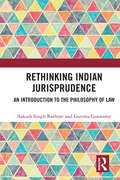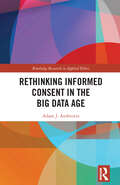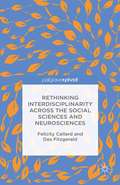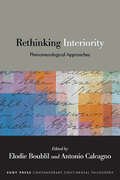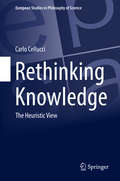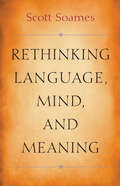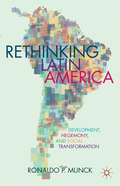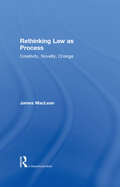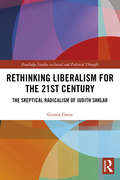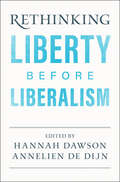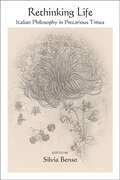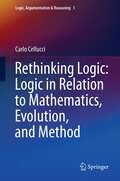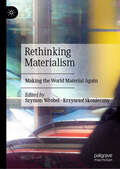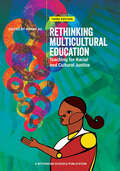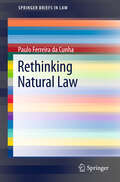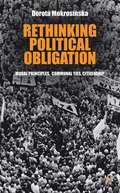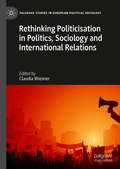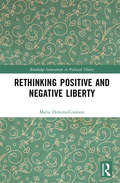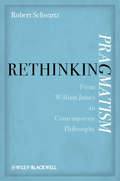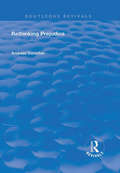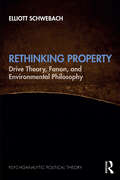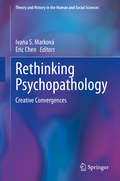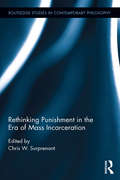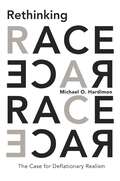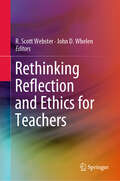- Table View
- List View
Rethinking Indian Jurisprudence: An Introduction to the Philosophy of Law
by Aakash Singh Rathore Garima GoswamyWhat is law? What is the source of law? What is the law for? How does law differ from other norms or codes of conduct? What is the difference between law and morality? Who is obligated to follow the law and why? What is the difference between moral and legal obligation? This book addresses these foundational questions about the law in general, and seeks to reorient our thoughts to the specific nature of law in India, the India of today, and the possible India of the future. This volume: covers relevant foundational elements, concepts and questions of the discipline; brings the uniqueness of Indian Philosophy of Law to the fore; critically analyzes the major theories of jurisprudence; examines legal debates on secularism, rationality, religion, rights and caste politics; and presents useful cases and examples, including free speech, equality and reservation, queer law, rape and security, and the ethics of organ donation. Lucid and accessible, the book will be indispensable to students, teachers and scholars of law, philosophy, politics as well as philosophy of law, sociology of law, legal theory and jurisprudence.
Rethinking Informed Consent in the Big Data Age (Routledge Research in Applied Ethics)
by Adam J. AndreottaIn the “big data age”, providing informed consent online has never been more challenging. Countless companies collect and share our personal data through devices, apps, and websites, fuelling a growing data economy and the emergence of surveillance capitalism. Few of us have the time to read the associated privacy policies and terms and conditions, and thus are often unaware of how our personal data are being used. This is a problem, as in the last few years, large tech companies have abused our personal data. As privacy self-management, through the mechanism of providing online consent, has become increasingly difficult, some have argued that surveillance capitalism and the data economy more broadly need to be overthrown.This book presents a different perspective. It departs from the concept of revolutionary change to focus on pragmatic, incremental solutions tailored to everyday contexts. It scrutinises how consent is currently sought and provided online and offers suggestions about how online consent practices can be improved upon. These include the possibility of subjecting consent-gathering practices to ethics committees for review; the creation of visual-based consent agreements and privacy policies to help with transparency and engagement; the development of software to protect privacy; and the idea of automated consent functionalities that allow users to bypass the task of reading vast amounts of online consent agreements. The author suggests that these “small-scale” changes to online consent-obtaining procedures could, if successfully implemented, provide us with a way of self-managing our privacy in a way that avoids a revolutionary dismantling of the data economy. In the process, readers are encouraged to rethink the very purpose of providing informed consent online.Rethinking Informed Consent in the Big Data Age will appeal to researchers in normative ethics, applied ethics, philosophy of law, and the philosophy of AI. It will also be of interest to business scholars, communication researchers, students, and those in industry.
Rethinking Interdisciplinarity across the Social Sciences and Neurosciences
by F. Callard D. FitzgeraldThis book offers a provocative account of interdisciplinary research across the neurosciences, social sciences and humanities. Rooting itself in the authors' own experiences, the book establishes a radical agenda for collaboration across these disciplines. This book is open access under a CC-BY license.
Rethinking Interiority: Phenomenological Approaches (SUNY series in Contemporary Continental Philosophy)
by Elodie Boublil; Antonio CalcagnoA philosophical exploration of the concept of interiority, Rethinking Interiority presents readers with its unmined aspects and senses, including ideas of an inner world and life, personal identity, auto-affection, and its social and political dimensions as well as its ethical possibilities. Internationally recognized scholars and philosophers investigate figures in the history of phenomenology as well as recent developments in psychology and the neurosciences to uncover not only the depths of interiority but also how it comes to connect with and structure external reality. Western and Eastern philosophical positions are addressed, creating a fruitful dialogue in which readers are invited to participate.
Rethinking Knowledge
by Carlo CellucciThis monograph addresses the question of the increasing irrelevance of philosophy, which has seen scientists as well as philosophers concluding that philosophy is dead and has dissolved into the sciences. It seeks to answer the question of whether or not philosophy can still be fruitful and what kind of philosophy can be such. The author argues that from its very beginning philosophy has focused on knowledge and methods for acquiring knowledge. This view, however, has generally been abandoned in the last century with the belief that, unlike the sciences, philosophy makes no observations or experiments and requires only thought. Thus, in order for philosophy to once again be relevant, it needs to return to its roots and focus on knowledge as well as methods for acquiring knowledge. Accordingly, this book deals with several questions about knowledge that are essential to this view of philosophy, including mathematical knowledge. Coverage examines such issues as the nature of knowledge; plausibility and common sense; knowledge as problem solving; modeling scientific knowledge; mathematical objects, definitions, diagrams; mathematics and reality; and more. This monograph presents a new approach to philosophy, epistemology, and the philosophy of mathematics. It will appeal to graduate students and researchers with interests in the role of knowledge, the analytic method, models of science, and mathematics and reality.
Rethinking Language, Mind, and Meaning
by Scott SoamesIn this book, Scott Soames argues that the revolution in the study of language and mind that has taken place since the late nineteenth century must be rethought. The central insight in the reigning tradition is that propositions are representational. To know the meaning of a sentence or the content of a belief requires knowing which things it represents as being which ways, and therefore knowing what the world must be like if it is to conform to how the sentence or belief represents it. These are truth conditions of the sentence or belief. But meanings and representational contents are not truth conditions, and there is more to propositions than representational content. In addition to imposing conditions the world must satisfy if it is to be true, a proposition may also impose conditions on minds that entertain it. The study of mind and language cannot advance further without a conception of propositions that allows them to have contents of both of these sorts. Soames provides it.He does so by arguing that propositions are repeatable, purely representational cognitive acts or operations that represent the world as being a certain way, while requiring minds that perform them to satisfy certain cognitive conditions. Because they have these two types of content--one facing the world and one facing the mind--pairs of propositions can be representationally identical but cognitively distinct. Using this breakthrough, Soames offers new solutions to several of the most perplexing problems in the philosophy of language and mind.
Rethinking Latin America
by Ronaldo MunckLatin America is assuming an increasingly important position on the world stage with its heterodox economic policies and bold political experiments attracting world-wide attention in an era characterized by a general crisis of perspectives. Since European colonization from 1500 onwards, the region has played a key role in the modernization and enrichment of Europe and the West. Today, the West is in crisis and the whole Enlightenment discourse is thrown into question. Is it possible that Latin America now shows the West where it is heading? With complex, dynamic, conflictual, but, above all, original processes of development - and with new visions of social transformation and new constructions of hegemony - the region offers a fascinating laboratory for the rest of the world and, maybe, a mirror of the future.
Rethinking Law as Process: Creativity, Novelty, Change
by James MacLeanFirst published in 2013. Routledge is an imprint of Taylor & Francis, an informa company.
Rethinking Liberalism for the 21st Century: The Skeptical Radicalism of Judith Shklar (Routledge Studies in Social and Political Thought)
by Giunia GattaRethinking Liberalism for the 21st Century offers an indispensable reexamination of the life, work, and interventions of a prominent liberal political theorist of the 20th century: Judith Shklar. Drawing on published and unpublished sources including Shklar’s correspondence, lecture notes, and other manuscripts, Giunia Gatta presents a fresh theoretical interpretation of Shklar’s liberalism as philosophically and politically radical. Beginning with a thorough reconstruction of Shklar’s life and her interest in political theory, Gatta turns her attention to examining the tension between Shklar’s critique of the term "modernity" and her passion for Enlightenment thinkers, including Rousseau and Hegel. In the second part of the book, Gatta roots Shklar’s liberalism of permanent minorities in her work in the history of political thought, and highlights this contribution as a fundamental recasting of liberalism as the political philosophy of outsiders. She makes a compelling argument for a liberalism of permanent minorities that refuses to stand on the ground of firm foundations and, instead, is oriented by complex understandings of cruelty and fear. Rethinking Liberalism for the 21st Century is a much-needed reorientation of traditional liberal policies, allowing for a more meaningful intervention in many contemporary debates. As such, it will be of interest to scholars of political theory, the history of political thought and ideas, philosophy, international relations, and political science in general.
Rethinking Liberty before Liberalism
by Hannah Dawson Annelien De DijnOpens up new histories of freedom and republicanism by building on Quentin Skinner's ground-breaking Liberty before Liberalism nearly twenty five years after its initial publication. Leading historians and philosophers reveal the neo-Roman conception of liberty that Skinner unearthed as a normative and historical hermeneutic tool of enormous, ongoing power. The volume thinks with neo-Romanism to offer reinterpretations of individual thinkers, such as Montaigne, Grotius and Locke. It probes the role of neo-Roman liberty within hierarchies and structures beyond that of citizen and state – namely, gender, slavery, and democracy. Finally, it reassesses the relationships between neo-Romanism and other languages in the history of political thought: liberalism, conservatism, socialism, and the human rights tradition. The volume concludes with a major reappraisal by Skinner himself.
Rethinking Life: Italian Philosophy in Precarious Times (SUNY series in Contemporary Italian Philosophy)
by Silvia BensoThis volume gathers fourteen contributions written by Italian philosophers within the context of the precariousness and vulnerability revealed by the Covid-19 pandemic. The pandemic compels us to rethink what is affected most by this global occurrence yet does not end with it—that is, life. Beyond the geographical, socio-political, and medical contexts in which the reflections originate, Rethinking Life is deeply utopian, presenting aspirations toward a different configuration of life and collective living centered on relational subjectivities, interconnectedness, interdependence, and, ultimately, solidarity. How does the pandemic—what it represents and exposes—call us to rethink our notion of life? How does an episode of morbidity affect a fuller understanding of life? Can such a hermeneutic shift be dared and sustained? The sobriety of the reflections yields elegant, incisive, and direct prose of profound effect and immediacy—and a captivating, lucid, and thought-provoking narrative.
Rethinking Logic: Logic in Relation to Mathematics, Evolution, and Method
by Carlo CellucciThis volume examines the limitations of mathematical logic and proposes a new approach to logic intended to overcome them. To this end, the book compares mathematical logic with earlier views of logic, both in the ancient and in the modern age, including those of Plato, Aristotle, Bacon, Descartes, Leibniz, and Kant. From the comparison it is apparent that a basic limitation of mathematical logic is that it narrows down the scope of logic confining it to the study of deduction, without providing tools for discovering anything new. As a result, mathematical logic has had little impact on scientific practice. Therefore, this volume proposes a view of logic according to which logic is intended, first of all, to provide rules of discovery, that is, non-deductive rules for finding hypotheses to solve problems. This is essential if logic is to play any relevant role in mathematics, science and even philosophy. To comply with this view of logic, this volume formulates several rules of discovery, such as induction, analogy, generalization, specialization, metaphor, metonymy, definition, and diagrams. A logic based on such rules is basically a logic of discovery, and involves a new view of the relation of logic to evolution, language, reason, method and knowledge, particularly mathematical knowledge. It also involves a new view of the relation of philosophy to knowledge. This book puts forward such new views, trying to open again many doors that the founding fathers of mathematical logic had closed historically.
Rethinking Materialism: Making the World Material Again
by Szymon Wróbel Krzysztof SkoniecznyTaking as its starting point the diagnosis that events such as the pandemic, the ecological crisis, and the increasingly volatile international situation have made our relationship to the world problematic, the book aims to survey the ways in which this new situation can be productively theorized. Its three parts focus on: discourses of the &“loss&” of the world; attempts at resistance to this loss and regaining the &“common&” world; and discussions of matter as the &“stuff&” of the world.
Rethinking Multicultural Education: Teaching for Racial and Cultural Justice
by Wayne AuFrom book bans, to teacher firings, to racist content standards, the politics of teaching race and culture in schools have shifted dramatically in recent years. This 3rd edition of Rethinking Multicultural Education has been greatly revised and expanded to reflect these changing times, including sections on “Intersectional Identities,” “Anti-Racist Teaching Across the Curriculum,” “Teaching for Black Lives,” and “K-12 Ethnic Studies,” among others. Practical, rich in story, and analytically sharp, Rethinking Multicultural Education can help current and future educators as they seek to bring racial and cultural justice into their own classrooms.
Rethinking Natural Law
by Paulo Ferreira da CunhaFor centuries, natural law was the main philosophical legal paradigm. Now, it is a wonder when a court of law invokes it. Arthur Kaufmann already underlined a modern general "horror iuris naturalis". We also know, with Winfried Hassemer, that the succession of legal paradigms is a matter of fashion. But why did natural law become outdated? Are there any remnants of it still alive today? This book analyses a number of prejudices and myths that have created a general misconception of natural law. As Jean-Marc Trigeaud put it: there is a natural law that positivists invented. Not the real one(s). It seeks to understand not only the usual adversaries of natural law (like legalists, positivists and historicists) but also its further enemies, the inner enemies of natural law, such as internal aporias, political and ideological manipulations, etc. The book puts forward a reasoned and balanced examination of this treasure of western political and juridical though. And, if we look at it another way, natural law is by no means a loser in our times: because it lives in modern human rights.
Rethinking Political Obligation
by Dorota MokrosinskaWhat are the grounds for and limits to obedience to the state? This book offers a fresh analysis of the debate concerning the moral obligation to obey the state, develops a novel account of political obligation and provides the first detailed argument of how a theory of political obligation can apply to subjects of an unjust state.
Rethinking Politicisation in Politics, Sociology and International Relations (Palgrave Studies in European Political Sociology)
by Claudia WiesnerThis book decisively advances the academic debate on politicisation beyond the state of the art. It is the first book to theorise and conceptualise ‘politicisation’ across the epistemic communities of different subdisciplines, bringing together the different strands in the debate: (international) political theory, political sociology, comparative politics, EU studies, legal theory and international relations. This provides a comprehensive discussion of different concepts of politicisation, their ontological and theoretical backgrounds, and their analytical value, including speech-act, practice- and actor-oriented approaches. Furthermore, the linkages of politicisation to the concepts of politics and the political, democracy, depoliticisation, juridification, populism, and Euroscepticism are clarified. Finally, the book shows how the methodological toolbox in empirical politicisation research can be completed regarding different arenas, actors and modes of politicisation. The volume thus provides a much-needed theoretical and conceptual reflection to the newly emerging research field of politicisation in order to recognise and define the key issues and build a solid foundation for further debate and empirical research. ‘When does something come to be considered political - for good or for ill? In social scientific terms, what is politicisation, under what conditions does it occur, created by whom, and with what consequences. These questions drive this outstanding collection of papers that explore how politicization is to be theorized and methodologies for its study. Rather than just a special sphere of activity, the volume demonstrates how politics is best thought of as an activity that can occur across individual and various collective levels. One of the signature contributions of this volume is its exploration of these issues across disciplines: political science, philosophy, sociology and international relations. The texts will be of interest to all students of politics at a time when the very basis of political identity, action, and organization is contested, normatively and analytically. The texts will help bring clarity to these debates.’ —David L. Swartz, Department of Sociology, Boston University, USA ‘Politization has become a widely used and disputed term In International Relations (IR) and more recently in comparative politics as well. This edited volume tries to elevate the term politization onto an analytical concept by i.a. opening it up for action theoretical and organizational approaches. One of the great achievements of the editor is to bring conceptual order into a dispersed debate across political science and its subdisciplines. Moreover, the contributions show how to apply the concept(s) of politization on such different subjects such as democratization, de-democratization, transitions, denationalization or the emergence of populism and Euroscepticism. This is a muchawaited book which can become a conceptual point of reference for better understanding the evolution of national and international regimes.’ —Wolfgang Merkel, Humboldt University of Berlin, Germany
Rethinking Positive and Negative Liberty (Routledge Innovations in Political Theory)
by Maria Dimova-CooksonThis book argues that the distinction between positive and negative freedom remains highly pertinent today, despite having fallen out of fashion in the late twentieth century. It proposes a new reading of this distinction for the twenty-first century, building on the work of Constant, Green and Berlin who led the historical development of these ideas. The author defends the idea that freedom is a dynamic interaction between two inseparable, yet sometimes fundamentally, opposed positive and negative concepts – the yin and yang of freedom. Positive freedom is achieved when one succeeds in doing what is right, while negative freedom is achieved when one is able to advance one’s wellbeing. In an environment of culture wars, resurging populism and challenge to progressive liberal values, recognising the duality of freedom can help us better understand the political dilemmas we face and point the way forward. The book analyses the duality of freedom in more philosophical depth than previous studies and places it within the context of both historical and contemporary political thinking. It will be of interest to students and scholars of liberalism and political theory.
Rethinking Pragmatism
by Robert SchwartzRethinking Pragmatism explores the work of the American Pragmatists, particularly James and Dewey, challenging entrenched views of their positions on truth, meaning, instrumentalism, realism, pluralism and religious beliefs. It clarifies pragmatic ideas and arguments spelling out the significant implications they have for present-day philosophical controversies. Explores the work of the American Pragmatists, especially James and Dewey, on the issues of truth, reference, meaning, instrumentalism, essences, realism, pluralism and religious beliefs. The only available publication to provide a detailed commentary on James's book, Pragmatism, while exploring the implications of the American Pragmatists' ideas and arguments for contemporary philosophical issuesChallenges standard readings of the American Pragmatists' positions in a way that illuminates and questions the assumptions underlying current discussions of these topics.Coherently arranged by structuring the book around the themes discussed in each chapter of James's original work.Provides a new analysis and understanding of the pragmatic theory of truth and semantics.
Rethinking Prejudice (Routledge Revivals)
by Andreas DorschelThis title was first published in 2000. Rethinking Prejudice offers the first philosophical monograph on the concept of prejudice. It takes its start from a study of Enlightenment thought, and pursues the topic to the reassessment of prejudice in contemporary hermeneutics. Yet history of ideas is a means rather than an end in this book. Dorschel analyzes the debates about prejudice from the 17th century onwards in order to shed light upon present concerns. Prejudice is not something peculiar to racists and similarly sinister figures, Dorschel argues; rather, it is an indispensable part of everyone's intellectual repertoire; if relevant phenomena are to be criticized, a genuine moral stance cannot be avoided. This book introduces and explores a topic of wide interest, particularly to those researching within the fields of philosophy, history of ideas, cultural studies, and social and political theory.
Rethinking Property: Drive Theory, Fanon, and Environmental Philosophy (Psychoanalytic Political Theory)
by Elliott SchwebachIn this eye-opening study at the intersection of psychoanalytic theory and political organization and thought, Elliott Schwebach explores why property can be understood to be oppressive and how political theory overlooks its unique significance as a pillar of social violence.Synthesizing insights from Pierre-Joseph Proudhon, Sigmund Freud, Ives Hendrick, and Frantz Fanon, Schwebach investigates human activity as shaped by the effects of property regimes and traces broader implications for understanding the legacies of colonial domination. He then shifts focus to contemporary eco-theory, challenging the Lockeanism that continues to characterize premodern Indigenous environmental engagements and presenting novel frameworks for understanding healthy ecopolitical activity based upon the trajectories of psychological drives.This unique perspective validates creative expressions of decolonial resistance and offers fruitful alternatives to customary positions in psychoanalytic and environmental political philosophy. The book will be an indispensable resource for scholars of property, Freudian psychology, political ecology, and the visionary thought of Frantz Fanon.
Rethinking Psychopathology: Creative Convergences (Theory and History in the Human and Social Sciences)
by Ivana S. Marková Eric ChenThis book presents an original approach to the study of psychiatry that is based on a justified epistemological position, which demands that both the natural and the human/social sciences are necessary in developing our understanding. Psychiatry as a medical specialism was constructed in the nineteenth century through the interplay of both the natural sciences and the human/social sciences. This interplay has created a hybrid discipline that spans biological and socio-cultural-historical domains, which has raised challenges for its understanding and research. This book focuses on one of the principal challenges – how can we explore mental symptoms and mental disorders as complexes of neurobiology on the one hand and meaning on the other?The chapters in this book, dedicated to Germán E Berrios, founder of the Cambridge school of psychopathology, tackles distinctive aspects of psychopathology or related areas. By means of a combination of approaches, chapters seek to unfold another element in our understanding of this field as well as raise new directions for its further study. Rethinking Psychopathology is a valuable resource for clinical psychologists and psychotherapists, psychological researchers, historians of psychology, cultural psychologists, critical psychologists, social scientists, philosophers of psychology, and philosophers of science.
Rethinking Punishment in the Era of Mass Incarceration (Routledge Studies in Contemporary Philosophy)
by Chris W. SurprenantOne of the most important problems faced by the United States is addressing its broken criminal justice system. This collection of essays offers a thorough examination of incarceration as a form of punishment. In addition to focusing on the philosophical aspects related to punishment, the volume’s diverse group of contributors provides additional background in criminology, economics, law, and sociology to help contextualize the philosophical issues. The first group of essays addresses whether or not our current institutions connected with punishment and incarceration are justified in a liberal society. The next set of chapters explores the negative effects of incarceration as a form of punishment, including its impact on children and families. The volume then describes how we arrived at our current situation in the United States, focusing on questions related to how we view prisons and prisoners, policing for profit, and the motivations of prosecutors in trying to secure convictions. Finally, Rethinking Punishment in the Era of Mass Incarceration examines specific policy alternatives that might offer solutions to our current approach to punishment and incarceration.
Rethinking Race: The Case For Deflationary Realism
by Michael O. HardimonBecause science has shown that racial essentialism is false, and because the idea of race has proved virulent, many people believe we should eliminate the word and concept entirely. Michael Hardimon criticizes this thinking, arguing that we must recognize the real ways in which race exists in order to revise our understanding of its significance.
Rethinking Reflection and Ethics for Teachers
by R. Scott Webster John D. WhelenThis book reexamines reflection and ethics for teachers, and argues the case for ensuring teaching practices are educational and professional rather than simply technical or clinical. Demonstrating that theory is indispensable when it comes to professional deliberation and educational practice, the authors draw on their experience to provide insights for teachers that will enable them to become better professional educators. This collection of research chapters, written by established researchers and educators in the field who are familiar with a variety of teaching contexts and are conversant with the current teaching standards and policies relating to teaching and teacher education, is a valuable resource for practicing teachers, researchers, policy-makers as well as for final-year student-teachers in Initial Teacher Education programs. Further, it enables early career teachers to meet their professional responsibilities in a more critically informed and capable manner.
